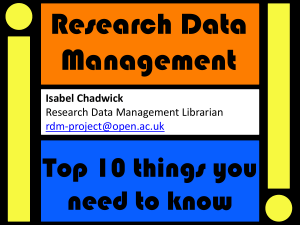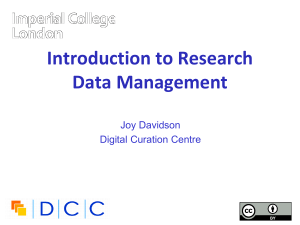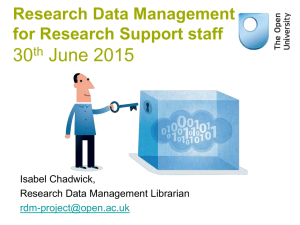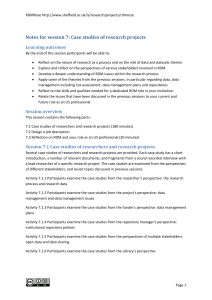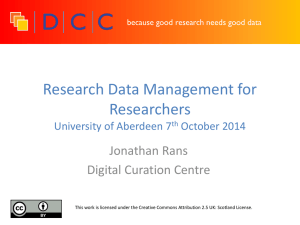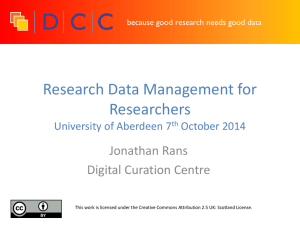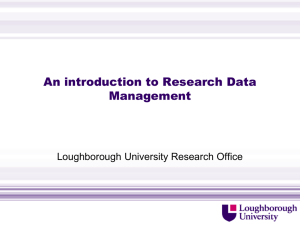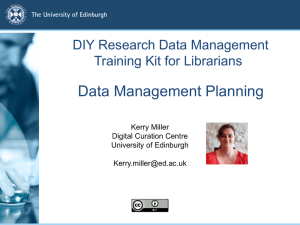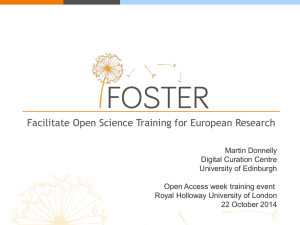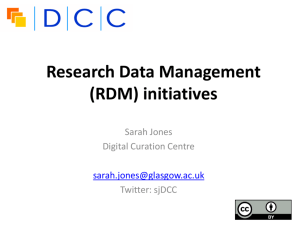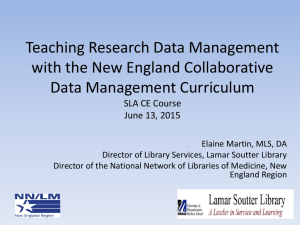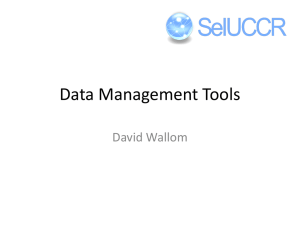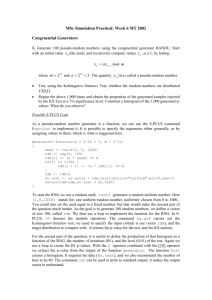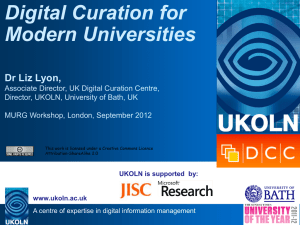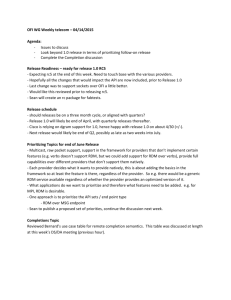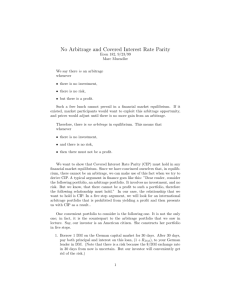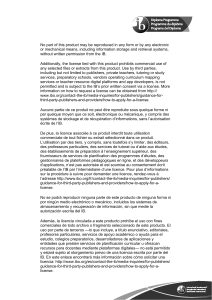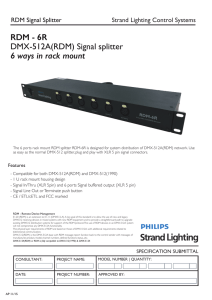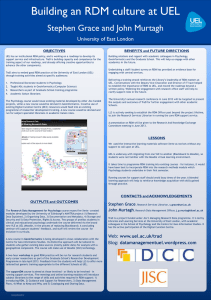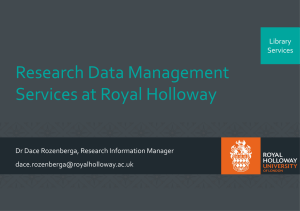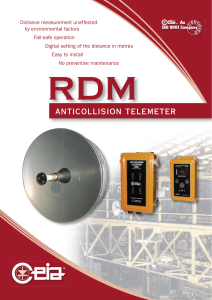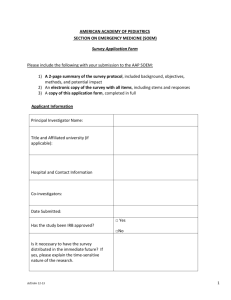Research Data Management for librarians
advertisement
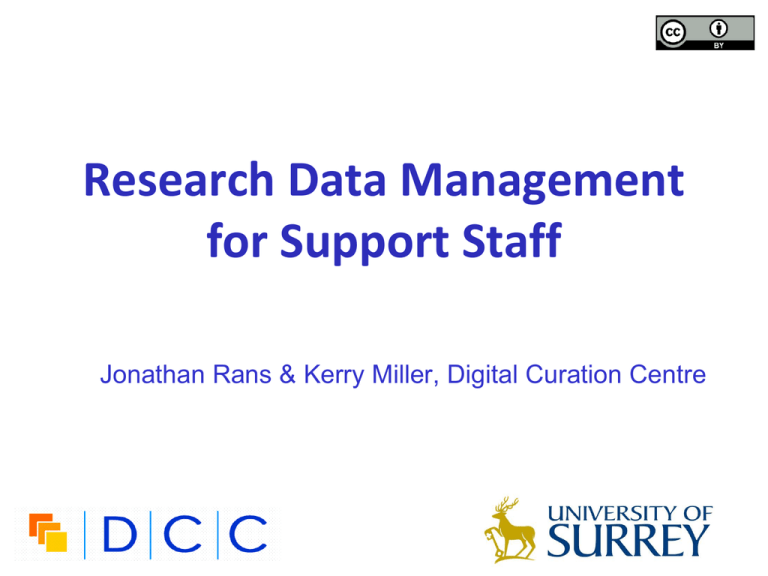
Research Data Management
for Support Staff
Jonathan Rans & Kerry Miller, Digital Curation Centre
About this course
Short presentations with exercises and discussion
Five main sections
Research data and RDM (30 mins)
RDM at Surrey (15 mins)
Skills exercise
Data Management Planning (30 mins)
Data sharing (30 mins)
Breakout sessions –
Practical DMP support or Metadata and Documentation
Lunch @ 13:30
Introductions
Introduce yourself and offer a reflection on the questions:
What is your understanding of research?
Do you know anything about data management?
What do you want to find out today?
How do you see yourself supporting RDM?
Research data and RDM
So, what is meant by ‘research data’?
Anything & everything
produced in the course of
research
Defining research data
Research data are collected, observed or created, for the
purposes of analysis to produce and validate original
research results
Both analogue and digital materials are 'data'
Lab notebooks and software may be classed as 'data'
Digital data can be:
created in a digital form ('born digital')
converted to a digital form (digitised)
Types of research data
Instrument measurements
Experimental observations
Still images, video and audio
Text documents, spreadsheets, databases
Quantitative data (e.g. household survey data)
Survey results & interview transcripts
Simulation data, models & software
Slides, artefacts, specimens, samples
Sketches, diaries, lab notebooks …
What is data management?
“the active management and appraisal of data over the
lifecycle of scholarly and scientific interest”
Digital Curation Centre
What is involved in research data
management (RDM)?
Data Management Planning
Creating data
Documenting data
Create
Preserve
Document
Share
Use
Accessing / using data
Storage and backup
Sharing data
Preserving data
Store
What do research funders expect?
http://www.dcc.ac.uk/resources/policy-and-legal/overview-funders-data-policies
RDM principles and advice
to share with researchers
n.b. Data Management Planning and Data Sharing are
covered in separate sections
See in particular:
UK Data Archive, Managing and sharing data: best practice for researchers
http://data-archive.ac.uk/media/2894/managingsharing.pdf
Data creation
Decide what data will be created and how - this should be
communicated to the whole research team
Develop procedures for consistency and data quality
Choose appropriate software and formats - some are better
for long-term preservation and reuse
Ensure consent forms, licences and partnership
agreements don’t limit options to share data if desired
Documentation
Collect together all the information users would need to
understand and reuse the data
Create metadata at the time - it’s hard to do later
Use standards where possible
Name, structure and version files clearly
Access and use
Restrict access to those who need to read/edit data
Consider the data security implications of where you store
data and from which devices you access files
Choose appropriate methods to transfer / share data
filestores & encrypted media rather than email & Dropbox
Storage and backup
Use managed services where possible e.g. Surrey shared
drives rather than local or external hard drives
Ask the local IT team for advice
3… 2… 1… backup!
at least 3 copies of a file
on at least 2 different media
with at least 1 offsite
Data selection
It’s not possible – or desirable - to keep everything.
Select based on:
What has to be kept e.g. data underlying publications
What legally must be destroyed
What can’t be recreated e.g. environmental recordings
What is potentially useful to others
The scientific or historical value
Guidance on selection and appraisal
http://www.dcc.ac.uk/resources/how-guides
https://intranet.birmingham.ac.uk/as/libraryservices/records/guidelines.aspx
http://www.nerc.ac.uk/research/sites/data/documents/data-value-checklist.pdf
Data preservation
Be aware of requirements to preserve data
Consult and work with experts in this field
Use available subject repositories, data centres and
structured databases
http://databib.org
http://www.re3data.org/
http://www.zenodo.org
Skills
How are support staff engaging in RDM?
Defining institutional strategy and policy
Implementing infrastructure
Advising researchers
Developing and delivering training
Supporting data management planning
Supporting data sharing
...
Research
Office
www.dcc.ac.uk/community/institutional-engagements
Library
IT
When does RDM engagement happen?
Responding to researcher requests
Institutional support projects
Fulfilling funder requirements
FOI requests
Etc.
Exercise: skills to support RDM
Based on the activities we discussed earlier, consider who may
have relevant skills or expertise to share.
You have 15 minutes
Activity
Copyright
Data Citation
Information Literacy
Data Storage
Digital Preservation
Metadata
…
The Library
IT
Research
Enterprise Services
Other Research
Support Services
Conclusion
Acknowledgement
This Training has been adapted from the RDM for
Librarians course created jointly by the DCC and the
University of Northampton. Full details at:
http://www.dcc.ac.uk/training/rdm-librarians
Acknowledgement
Ideas and content have been taken from various courses:
Skills matrix, ADMIRe project, University of Nottingham
http://admire.jiscinvolve.org/wp/2012/09/18/rdmnottingham-training-event
DIY Training Kit for Librarians, University of Edinburgh
http://datalib.edina.ac.uk/mantra/libtraining.html
Managing your research data, Research360, University of Bath
http://opus.bath.ac.uk/32296
RDMRose Lite, University of Sheffield
http://rdmrose.group.shef.ac.uk/?page_id=364
RoaDMaP training materials, University of Leeds
http://library.leeds.ac.uk/roadmap-project-outputs
SupportDM modules, University of East London
http://www.uel.ac.uk/trad/outputs/resources
